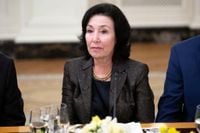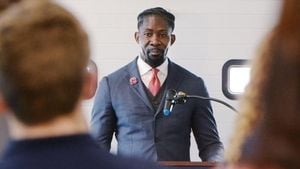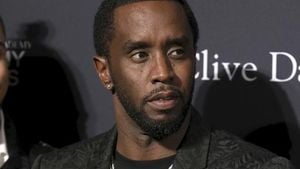Canada’s relationship with TikTok has rarely been straightforward, but recent developments have pushed the debate over the popular social media platform into even murkier waters. On October 1, 2025, Canadian officials restated their conviction that TikTok poses a significant threat to national security and the privacy of Canadian youth, citing the app’s extensive collection of personal data from its users. This concern isn’t new—last year, Canada ordered TikTok to shut down its Canadian operations, and the United States followed suit with a law threatening to block the app unless its U.S. operations were sold to American investors.
The latest twist in this ongoing saga came when the White House announced a deal had been struck between the U.S., China, and TikTok’s parent company to sell the app’s U.S. operations and its influential algorithm to a group of high-profile American investors. The names at the center of this deal are some of the biggest in the tech and media world: Oracle founder Larry Ellison, Dell CEO Michael Dell, and Lachlan Murdoch, the heir apparent to the Fox News media empire. According to the Winnipeg Free Press, the Trump administration stated that Ellison would oversee the algorithm to ensure it wasn’t used for “malicious purpose”—though, notably, the precise definition of what constitutes an unacceptable use of the algorithm remains unclear.
Even as U.S. and Canadian authorities have pressured TikTok to divest or face the prospect of being blocked, the app continues to operate freely in both countries. The underlying worry, as reported by the Winnipeg Free Press, is that TikTok’s data collection practices haven’t changed—regardless of who owns the company. TikTok has denied allegations that it provides user data to the Chinese government, but under Chinese law, the government can demand access to any app’s data at any time. This legal reality, combined with the app’s immense popularity (billions of users worldwide), has fueled persistent anxiety among Western governments.
The U.S. law compelling TikTok’s divestiture was widely seen as a move to curb potential foreign influence and secure American data. But the current deal, which places TikTok’s U.S. operations in the hands of a select group of American billionaires, has raised new concerns about transparency, fairness, and the possibility of data misuse—this time, by American interests. According to the Winnipeg Free Press, former President Donald Trump was directly involved in negotiating the deal, though his administration has denied any plans for official involvement on the board or in daily operations. Still, the perception lingers that the chosen investors may feel a certain “debt of gratitude” to Trump. What, exactly, might be expected in return? That’s a question many in Canada and beyond are now asking.
Adding another layer to the story are revelations about the personal and political agendas of the new stewards of TikTok’s algorithm. Oracle CEO Safra Catz, who is leading the acquisition, has a longstanding history of pro-Israel advocacy. As reported by Responsible Statecraft, in a 2015 email to former Israeli Prime Minister Ehud Barak, Catz wrote, “We have all been horrified by the growth of the BDS movement in college campuses and have concluded that we have to fight this battle before the kids even get to college. We believe that we have to embed the love and respect for Israel in the American culture. That means getting the message to the American people in a way they can consume it.”
Catz went on to mention her sister, Saritz Catz, a Hollywood writer-producer and prominent pro-Israel activist, who was working on a reality show called “Women of the IDF” aimed at humanizing the Israeli Defense Forces in the eyes of Americans. This correspondence, first reported in a hack of Barak’s email, highlights the deep connections between Oracle’s leadership and pro-Israel advocacy efforts in the U.S.
Meanwhile, Larry Ellison—Oracle’s chief technology officer and an outspoken supporter of Israel—is poised to play a central role in overseeing TikTok’s algorithm. While sources say Catz will not be directly involved with the algorithm itself, her past actions and emails have fueled speculation about the broader agenda guiding Oracle’s leadership. As Responsible Statecraft noted, many conservatives and liberals alike believe the algorithm has played a significant role in shaping young Americans’ perceptions of Israel, especially in light of recent events in Gaza.
These concerns have only intensified following comments from Israeli Prime Minister Benjamin Netanyahu. In late September 2025, Netanyahu publicly described the purchase of TikTok as a “critical and strategic move” to garner support for Israel. “We have to fight with the weapons that apply to the battlefield.… The most important purchase going on right now is … TikTok. Number one. And I hope it goes through because it can be consequential. And the other one? X. We have to talk to Elon. He’s not an enemy, he’s a friend. We should talk to him. Now, if we can get those two things, we get a lot.… We have to fight the fight, to give direction to the Jewish people and give direction to our non-Jewish friends,” Netanyahu stated, as reported by Responsible Statecraft.
For Canadian officials, the implications are troubling. The original concern was that TikTok’s data collection practices might allow the Chinese government to access sensitive information about Canadian citizens. Now, there’s a growing fear that the app’s vast troves of personal data could be leveraged by American political interests—or even used to shape public opinion on foreign policy issues like Israel-Palestine. As the Winnipeg Free Press pointed out, there’s nothing in the current deal that would prevent the continued harvesting of user data. For Canada and other nations, this means the risk of foreign influence remains, simply shifting from Beijing to Washington.
The deal’s opacity has only deepened suspicions. Critics argue that the process has been anything but fair or transparent, with a small group of hand-picked investors set to benefit from the carve-up of one of the world’s most influential social media platforms. The Trump administration’s direct involvement and the selection of close allies for the takeover have left many wondering whether the move is truly about national security—or something more political.
It’s not just a question of data security, either. The TikTok saga has become a flashpoint in the broader debate over the role of social media in shaping public opinion, influencing elections, and projecting soft power. With TikTok’s algorithm now under the control of individuals with clear political and ideological commitments, the platform’s future direction is far from certain. Will it become a tool for advancing specific agendas, as some fear? Or will new oversight mechanisms be put in place to safeguard user privacy and prevent abuse?
For now, TikTok continues to operate in Canada and the U.S. much as it always has, despite repeated threats of bans and shutdowns. But as the dust settles on this latest deal, one thing is clear: the debate over who controls the digital public square—and to what ends—is only just beginning. For Canadians, Americans, and social media users worldwide, the outcome will shape not only their digital privacy, but the information they see and the opinions they form for years to come.




